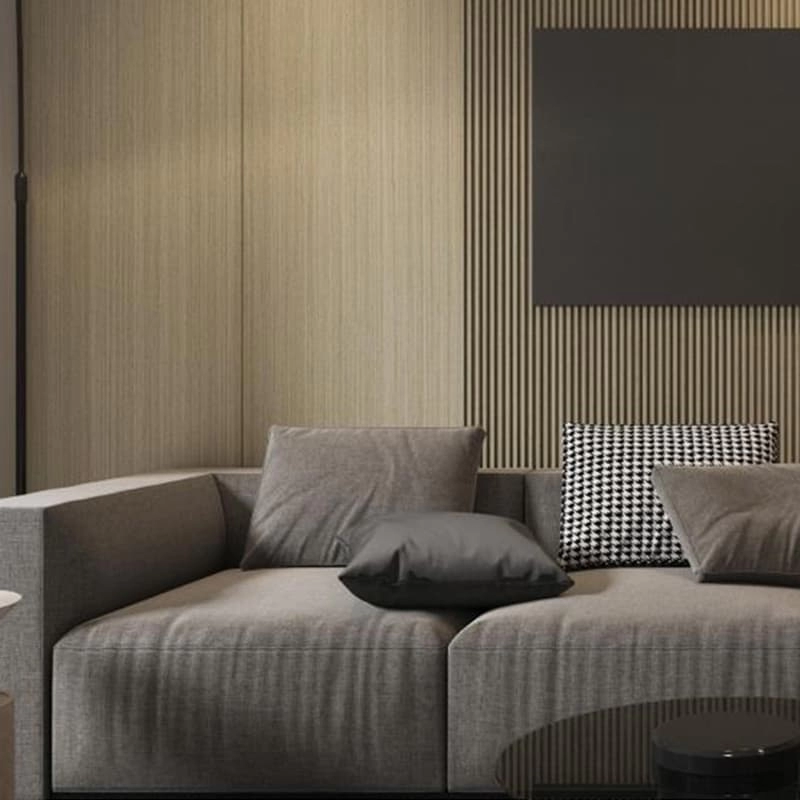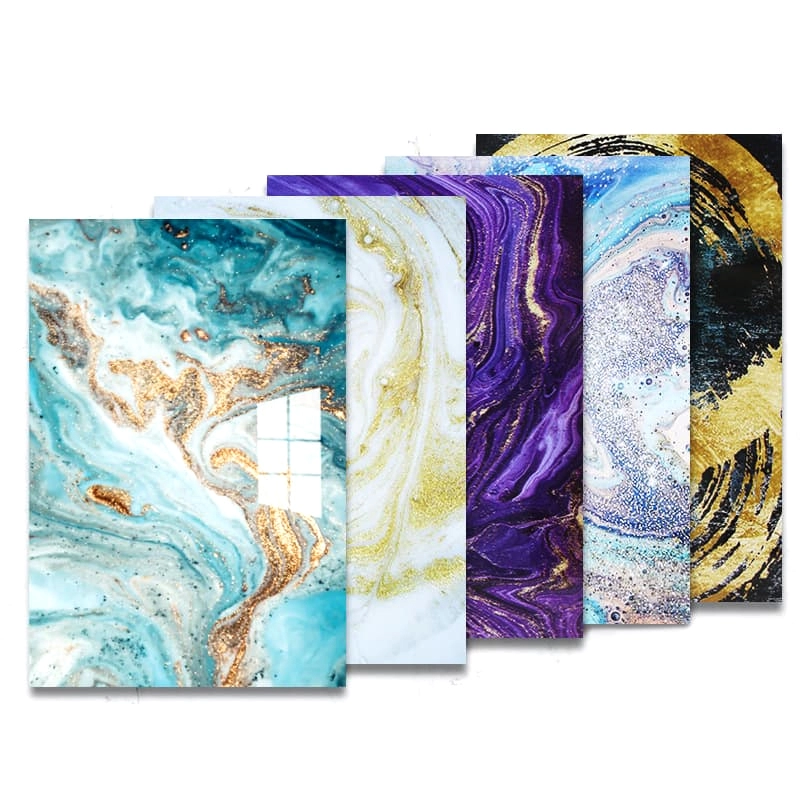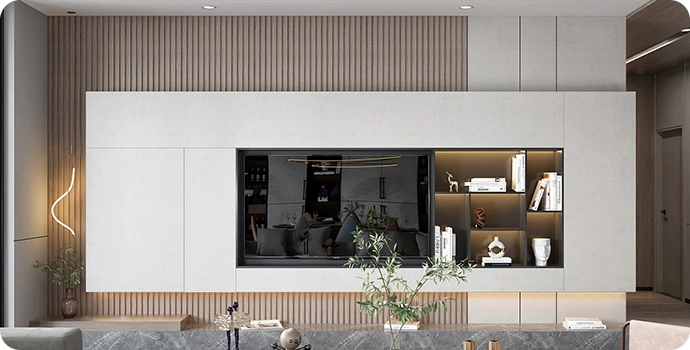CATEGORIES
PVC Wall Panels: Advantages and Disadvantages Compared to Drywall
PVC wall panels have become an increasingly popular choice in interior design as an alternative to traditional materials like drywall. But what are the advantages and disadvantages of PVC wall panels, and how do they compare to materials like drywall? In this comprehensive guide, we'll explore the pros and cons of PVC panels, helping homeowners, builders, and designers make informed decisions.
What Are PVC Wall Panels?
PVC (polyvinyl chloride) wall panels are decorative wall coverings made from a strong, durable plastic material. They offer a cost-effective alternative to traditional materials like wood or stone. PVC wall panels come in a wide range of colors, textures, and designs, making them a versatile choice for various interior design styles.

Advantages of PVC Wall Panels
1. Moisture and Pest Resistance
One of the key advantages of PVC wall panels is that they are highly resistant to moisture. Unlike wood, which can warp or rot when exposed to damp conditions, PVC panels are moisture-resistant, making them ideal for areas prone to humidity like bathrooms and basements. They are also resistant to pests such as termites.
2. Easy to Install
Installing PVC wall panels is a straightforward process. Their lightweight nature and tongue-and-groove design allow for quick installation, reducing labor costs. This ease of installation makes them a preferred choice for DIY projects and professional installations alike.
3. Low Maintenance and Easy to Clean
PVC panels offer a low maintenance solution. A simple wipe-down with a damp cloth is usually sufficient to keep them looking new. Their smooth surface resists stains and does not require painting or sealing.
4. Cost-Effective Alternative to Traditional Materials
PVC wall panels offer a cost-effective alternative to traditional wall coverings like drywall or wood paneling. They provide the appearance of more expensive materials without the high cost, making them a budget-friendly option.
5. Variety of Designs and Textures
PVC wall panels come in a wide range of colors, textures, and designs, including 3D designs. This variety allows for customization to suit different aesthetic preferences and interior design themes.

Disadvantages of PVC Wall Panels
1. Environmental Impact
Disadvantages of PVC include concerns about its environmental impact. PVC is a plastic product derived from petroleum, and its production and disposal can contribute to environmental pollution.
2. Heat Resistance
PVC panels have limitations in high temperatures. They are not as heat-resistant as materials like stone or brick. Exposure to high temperatures can cause PVC to warp or release harmful chemicals.
3. Durability Compared to Traditional Materials
While PVC panels are durable to an extent, they may not be as strong as traditional materials like wood or drywall. They can be susceptible to scratches and may not withstand heavy impacts.
4. Aesthetic Limitations
Despite the variety, some may find that PVC panels lack the authentic look and feel of natural materials like wood or stone. This can affect the overall aesthetic appeal for those seeking a more traditional or upscale appearance.
PVC Wall Panels vs. Drywall: A Comparison
Comparing PVC wall panels to drywall involves evaluating several factors:
| Feature | PVC Wall Panels | Drywall |
|---|---|---|
| Installation | Easy to install; less labor-intensive | Labor-intensive process |
| Moisture Resistance | Highly resistant to moisture; ideal for bathrooms | Can be damaged by moisture |
| Maintenance | Low maintenance; easy to clean | Requires regular maintenance |
| Fire Resistance | Less fire-resistant; may emit toxic fumes | More fire-resistant |
| Aesthetic Appeal | Wide variety of designs; may lack natural texture | Can be painted; offers flexibility |
| Cost | Cost-effective solution | Generally more expensive |
| Durability | Durable but less than drywall | Highly durable |
| Environmental Impact | Negative impact; non-recyclable | More environmentally friendly |
Are PVC Panels Durable?
PVC panels are durable in terms of resistance to moisture and pests. However, they may not be load-bearing and can be less impact-resistant compared to materials like drywall. Their lifespan can be sufficient for many applications, but they may show wear over time, especially in high-traffic areas.
Moisture Resistance: PVC Panels in Bathrooms
PVC wall panels are designed to withstand moist environments. This makes them an excellent choice for bathrooms and basements where moisture can be an issue. Their moisture resistance helps prevent mold and mildew growth, maintaining a healthier living space.
Fire Resistance and Safety Concerns
Panels are highly resistant to moisture but have limitations when it comes to fire. PVC can release toxic fumes when burned, posing a potential safety risk. It's essential to consider fire-resistant materials, especially in areas where fire hazards are a concern.
Environmental Impact of PVC Panels
The environmental impact of PVC panels is a significant disadvantage. PVC is not biodegradable, and its production releases harmful chemicals. Disposal of PVC panels contributes to landfill waste, and they are not easily recyclable.
Easy Installation and Maintenance
Installing PVC wall panels is simple and efficient. Their design allows for quick fitting without specialized tools. Low maintenance is another advantage, as they require only regular cleaning with a damp cloth to maintain their appearance.
Customization and Aesthetic Appeal
PVC panels come in a wide variety of styles, mimicking materials like wood, stone, or even 3D designs. This offers a wide range of customization options to suit different aesthetic preferences. However, they may not fully replicate the texture and warmth of natural materials.

For those interested in more natural-looking options, WPC (Wood Plastic Composite) wall panels are available. They combine the durability of plastic with the aesthetic of wood.
Cost-Effectiveness of PVC Wall Panels
PVC wall panels offer a cost-effective alternative to traditional wall coverings. Their lower material and installation costs make them an attractive option for budget-conscious projects. However, it's important to weigh this against potential drawbacks like environmental impact and durability.
Conclusion
PVC wall panels offer both advantages and disadvantages. They are easy to install, cost-effective, and resistant to moisture, making them suitable for areas like bathrooms and basements. However, they have limitations in terms of environmental impact, heat resistance, and may not provide the same aesthetic appeal as natural materials.
For those considering PVC panels, it's essential to evaluate your specific needs, preferences, and the pros and cons outlined above. Whether you're a homeowner, builder, or designer, understanding these factors will help you make an informed decision.
Summary: Key Points to Remember
- PVC Wall Panels are a cost-effective alternative to traditional materials like drywall.
- Advantages include moisture resistance, easy installation, low maintenance, and a variety of designs.
- Disadvantages involve environmental impact, limited heat resistance, and potential durability issues.
- PVC Panels vs. Drywall: PVC is easier to install and more moisture-resistant but less fire-resistant and potentially less durable.
- Ideal Uses: Bathrooms, basements, and areas where moisture resistance is crucial.
- Considerations: Balance cost-effectiveness with potential environmental and safety concerns.
Relevant Products
For more information on high-quality PVC wall panels and alternatives, visit Xihong.





